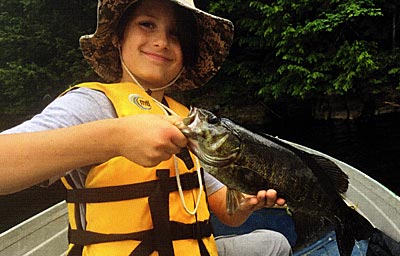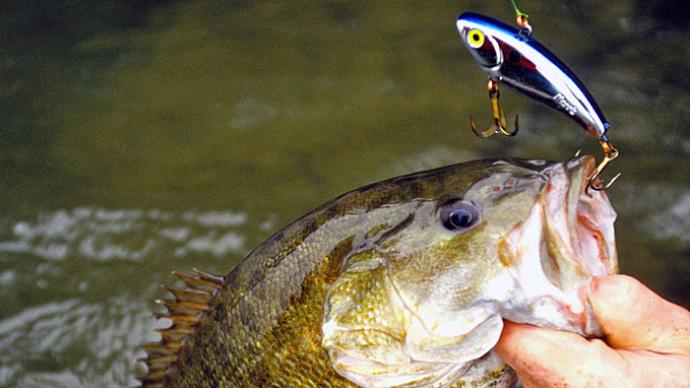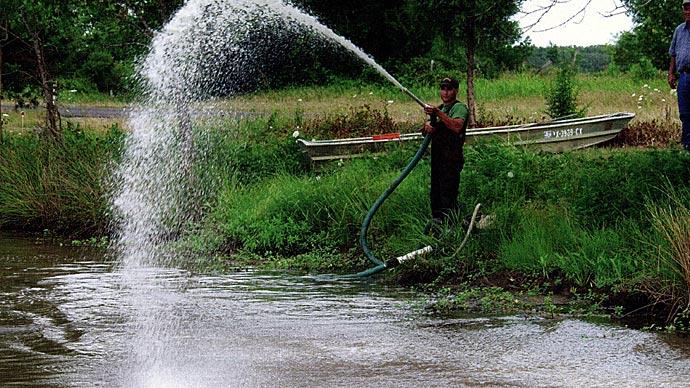
Old green paint flaked from the little aluminum boat as it drifted in the wind over car-sized boulders in the dark, tea-stained water of an Adirondack lake. The sun, sky, and clouds reflected off the water, giving you the serene feeling this lake had no end when you gazed at its mirror surface. Clad in a bright yellow life vest, my son watched the dimple his fishing line made on the surface where it entered. The line jogged to the side and he quickly reeled three times and lifted the rod tip. A 15" golden-colored smallmouth flew out of the water and cartwheeled, breaking the liquid mirror. After a furious battle, he brought the fish to the boat and after a quick photo and high-five, we were again on our way, teasing the prospects of another bronze-back. I nosed the boat around a point, into a shallow, weedy, soft-bottom bay. Not a rock in sight. A little bell went off in my mind that this had the feel of a good Largemouth spot. A huge pile of driftwood sat in the corner of the bay, and sun-bleached bones of giant trees extended into the shallow bay. The bait never made it to the bottom on the first cast. The line started moving sideways and a Largemouth burst to the surface and tail-walked across the front of the boat. Here were two different habitats—two different fish—within 100 yards of each other in a 4,000-acre lake. Largemouth and smallmouth living together. Can I do this in my pond?
Largemouth and smallmouth together, thriving in close proximity?
Like everything else in ecology, the answer to this question is—it depends. Let's get a couple of relatively solid fundamentals out of the way first. Largemouth bass are the dominant predator, no matter what North American freshwater system they are in. Yes, pike and muskie will eat Largemouth, but will likely not outcompete them. Both Largemouth and smallmouth will live and do well in ponds, lakes, and even rivers. Generally (and there are exceptions), smallmouth prefer a rockier littoral habitat, and Largemouth prefer a weedier littoral.
Largemouth will outcompete and extirpate smallmouth in small ponds and even small lakes where habitat diversity is low. In many ponds I study, the introduction of Largemouth into a smallmouth pond meant the end of the smallmouth within 5-7 years. The Largemouth simply eat all the young and juvenile smallmouth, but generally not the other way around. Largemouth are just too aggressive to allow smallmouth to recruit successful year classes and the smallmouth eventually disappear. This will happen faster if (1) the pond is small (2) the habitat uniform (3) there are few other prey fish to buffer predation on smallmouth.
Going back to that Adirondack lake for a minute. The lake was 4,000 acres and had huge habitat diversity. This lake had bluegill, pumpkinseed, yellow perch, golden shiner, white sucker and five other species of minnows to buffer focused predation on smallmouth. Further, the weedy littoral was abbreviated, meaning the smallmouth habitat outnumbered the
Largemouth habitat by 20:1. Interestingly, this is about the ratio of smallmouth to Largemouth we catch in the lake. Hmmm.
Now, back to a pond. If you have a one-acre pond (like I do) the answer to this topic question, "Can Largemouth and smallmouth thrive together?" is likely "No." Smallmouth and Largemouth will not behave nicely together. The pond is just too small to have the habitat complexity and diverse forage base for these two to live together in bass bliss. Largemouth bass will dominate and then extirpate smallmouth.
Could you do it? Sure, you can try, but you'll likely have to regularly restock fairly large smallmouth that cannot be eaten by big Billy Bucketmouth. In my small pond (and my recommendation to you), if smallmouth is to be maintained indefinitely, they should probably be on their own as the only predator, with no Largemouth.
With larger ponds and small lakes, habitat diversity (and the following prey fish diversity), seems to be the ticket that allow these two to exist together. I have studied 10-acre lakes that succeed in having both Largemouth and smallmouth together and larger, 40-acre lakes that fail. The 10-acre lake success story that comes to mind had limited shallow, weedy habitat and Largemouth and smallmouth were about equal in numbers. The 40-acre lake was all shallow and weedy. Smallmouth were eliminated from this larger, less diverse lake within seven years after Largemouth introduction. The Largemouth simply ate the smallmouth. The smallmouth are gone, and so are all the other fish other than Largemouth. Now the lake is chock full of cookie cutter 10" Largemouth that are stunted. It's bass on bass.
Can you successfully introduce smallmouth on top of Largemouth? I would advise against it. I doubt that in most ponds and lakes smallmouth could expand their population in the face of intense predation by Largemouth. If you want both basses in your diverse 10-acre or larger lake, get 3-5 years of a robust smallmouth population established. Get a diverse group of baitfish feeding those smallmouths, and only then stock a few small Largemouth (like 5 bass/acre of 4-6" fingerlings). Then see what happens. Warning: you probably will not get this decision back. Once Largemouth are established, that might be the end of your smallmouth bass.
Can you stock them both at once in a newly created pond or lake? Maybe, but I would want a huge forage base, not much Largemouth spawning habitat, and the smallmouth to outnumber the Largemouth stocked by 4:1. And even then, I think the smallmouth would eventually lose the battle.
After the Adirondack trip, we came home to tend to our mosquito and blackfly bites. After dinner, my son grabbed his fishing pole and strolled down to our pond. The second cast he hooked a smallmouth that came flying out of the water, much the same way the Adirondack bass had done. This was a 15" beauty that our own pond had produced—in a Largemouth-free zone. This pond was created in 2007 with smallmouth in mind as the top predator. Golden shiner, a few bullhead and pumpkinseed are the other fish that feed those bass. If I added Largemouth, those smallmouths would likely vanish in 3-5 years after my larger bass died out. Largemouth predation would limit the recruitment of smallmouth bass in the interim. Then I would be managing Largemouth and most likely, bluegill. And, the bass-bluegill relationship is one that I did not want in my home pond. We wanted smallmouth, which means in this 1.3-acre, uniform, non-diverse swimming and fishing hole, the smallmouth is the top dawg, lone predator. If you truly want the best small waters smallie pond, create their very best habitat, and as much of it as you can. Then, time will tell your bass story.
Reprinted with permission from Pond Boss Magazine



